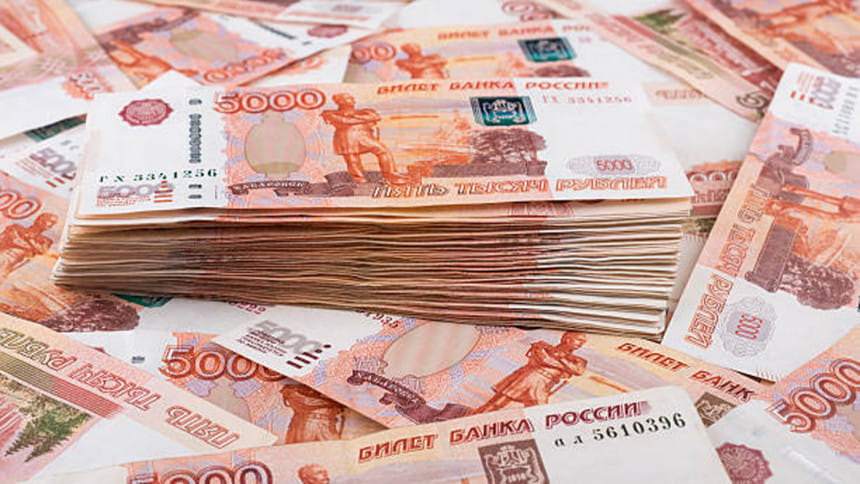Will Bangladesh benefit from trade in rouble?

Russia has included Bangladesh on its list of friendly and neutral countries, a development that would allow its local banks and brokers to settle trade transactions in the rouble.
The move is expected to provide a fillip to both countries, which are looking to cut their over-reliance on the US dollar.
Russia has been gradually reducing its dollar holdings since the imposition of Western sanctions following Moscow's annexation of Crimea in 2014, and has sought to partially decouple from the Western financial system, according to a Reuters article.
The switch accelerated since the outbreak of Russia-Ukraine war in February last year after the western economies slapped sanctions against Moscow.
The sanctions include freezing of a sizable volume of foreign currency reserves held by Russia and the removal of major Russian banks from SWIFT, an international payment system used by thousands of financial institutions.
Amid fast-depletion of the foreign currency reserves, Bangladesh has also been seeking to carry out international trade transactions in currencies other than the US dollar. It has already started doing so with India in the rupee.
But the same might not be possible in the case of Russia at present since the country's rouble holding is negligent, according to economic experts and bankers.
A senior official of the central bank, seeking anonymity, told The Daily Star that Bangladeshi banks will now able to trade in the rouble in two ways.
One of the ways is that the central bank may announce the rouble as a convertible currency. Another way is for local banks to perform bilateral trades in the Russian currency on a one-to-one basis, he informed.
Currently, local businesses are allowed to settle their foreign trade in eight currencies: the US dollar, Canadian dollar, Australian dollar, Singaporean dollar, the euro, the pound, Swiss franc and Chinese yuan.
On a one-to-one basis, the central bank of Bangladesh can select one or two local banks and Russia will have to select one or two of its banks. The selected banks then will be able to trade in the currency.
On July 11, Bangladesh and India started to trade in the rupee on a one-to-one basis.
But because of the war-related western sanctions on Russia, Bangladesh's trade with the country has already been affected.
Soon after the war broke out, SWIFT asked Bangladesh's banks to suspend transactions with seven Russian lenders since they were facing sanctions from the United States and the European Union over Moscow's invasion of Ukraine.
As a result, local banks have been unable to do business with the Russian lenders either directly or through a third party.
The sanctions hit Bangladesh's growing bilateral trade with Russia.
Two-way trade between Bangladesh and Russia was worth more than $1 billion before the conflict, with exports from Bangladesh standing at $665 million in the fiscal year of 2020-21.Bangladesh's exports to Russia slipped to $460.39 million in the last fiscal year from $638 million in 2021-22.
Syed Mahbubur Rahman, managing director of Mutual Trust Bank Ltd, said, "We have some export to Russia and insignificant import from there. So, it is less likely to take off. However we can give it a try."
Most of the exports to Russia are taking place through third countries, meaning Bangladesh is not getting the rouble as export proceeds, industry people say.
Around 90 percent of foreign trade in Bangladesh is conducted through the US dollar while the rest is through other foreign currencies, bankers said.
Although the use of other currencies continues to rise, the growth is not very high, they said.
Anis A Khan, a former chairman of the Association of Bankers Bangladesh, says if Bangladesh trades in the rouble, the country's reserve will decline further since it would lose the US dollar.
He, however, agreed that the trade in the rouble could be an interim option for bilateral trade.
"Russia has allowed our banks to trade in the rouble because it has no other option since it can't trade in US dollars due to the sanction."
Ahsan H Mansur, executive director of the Policy Research Institute of Bangladesh, echoed Khan.
He added: "There is no practical implementation of the trade in the rouble. Russia is trying to carry out transactions in its currency because it can't trade in the US dollar."
Mansur said Bangladesh receives some export proceeds in the rouble and exporters can use them to import. But the currency's use will not be wide.
Some countries, however, are carrying out trade transactions in the rouble.
The currency was used in 40 percent of all export transactions with SCO (Sanghai Cooperation Organisation) countries. Founded in 2001, SCO member countries include China, Russia, India, Pakistan, Kazakhstan, the Kyrgyz Republic, Tajikistan, Uzbekistan, and Iran.
Over 80 percent of trade settlement between Russia and China is now conducted in Russian rouble and Chinese yuan, the Global Times of China reported in June citing media reports.

 For all latest news, follow The Daily Star's Google News channel.
For all latest news, follow The Daily Star's Google News channel. 



Comments